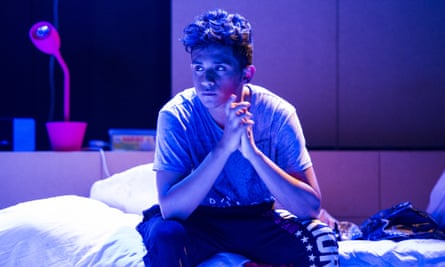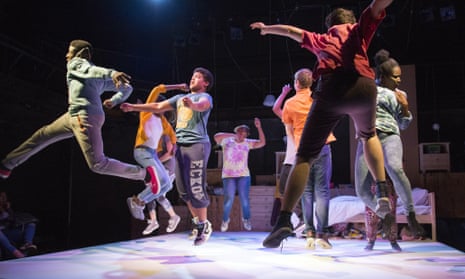At 9pm on Sunday 15 November, BBC Four will broadcast On Stage: Live at Television Centre, a very canny collaboration between Battersea Arts Centre, the BBC and the Arts Council which will bring contemporary theatre to television. It should offer something of a contrast to The Dresser, and a reminder of how much UK theatre has changed in the last 15 years.
It’s good to see the BBC focus on theatre, after too many years of neglect, and being bold in the programming. The broadcast will feature half-hour contributions from four companies: Touretteshero, Richard Dedomenici, Gecko and Common Wealth.
But there is another company involved too: Islington Community Theatre (ICT). Its show Brainstorm is a real cracker, exploring the teeming vibrancy of the developing adolescent brain. It was seen in north London venues earlier this year before it transferred to the NT’s Temporary theatre, where it will return next spring. It’s a pity that Brainstorm will not be broadcast along with the other shows on Sunday. Instead, it has been filmed in advance and will be available on iPlayer.
Like the other shows in Live from Television Centre, Brainstorm reflects that work created by and with young people is becoming one of the most fruitful areas of experimentation in British theatre. As Contact’s Matt Fenton observed earlier this year, it is increasingly the case that: “young-people-led work is as valid an artistic proposition for audiences as the work presented on any main stage across the country”. From Junction 25, a company of 11 to 18-year-olds in Glasgow, to the Roundhouse in London, where The Happiness Project jointly devised by teenagers and scientists is currently sold out, there is clearly an audience for work made by young people. It’s something I’m pretty certain was kickstarted in the UK by Ontroerend Goed’s influential 2008 show Once and for All We’re Gonna Tell You Who We Are So Shut Up and Listen.
These opportunities for young people to be creative are cheering. As its artistic director Ned Glasier observes, ICT is a place where a professional theatre-maker and a 12-year-old can have a conversation on an equal artistic basis, and the benefits definitely aren’t one way. The young people are makers, not performers. Glasier thinks the equation is very simple: many of the qualities necessary to be a good theatre-maker are those which are also found in good human beings.

The young people who join ICT are not self-selecting but are referred by teachers, youth workers and social workers, so they are a very diverse group. The offer made to them is a long-term one, lasting from the age of 10 or 11 until they are 20. This commitment to an extended process feeds into the work itself, which is also long-term and iterative. You couldn’t make a piece like Brainstorm with a hastily assembled group of young people. This is proper ensemble work, layered and complex.
Perhaps most importantly, Brainstorm and other young companies, such as Liverpool’s 20 Stories High, creates a rare space where young people can share with adults what they really think and feel, and where adults will really listen. But make no mistake: what ICT is doing is not social work but art; art that stands shoulder to shoulder with some of the most inventive and high quality theatre currently being made in the UK. Take a look at iPlayer on Sunday and see what I mean.

